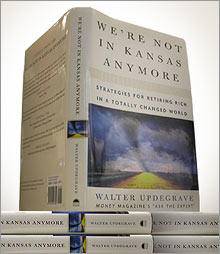|
|

|
|
More information on Updegrave's new book.
|
|
|
|
|
|
|
NEW YORK (CNN/Money) -
After 10 years of financial frustration trying to make ends meet in the land of Hummers and Botox, we have decided to take cash out of the ridiculous housing market in California and start all over in the Midwest.
My question: should we use the $250,000 profit we'll make on our California home to pay cash for our new house and then invest the mortgage payments we would have made? Or should we make a down payment on your new house, take out a mortgage and invest whatever remains of our $250,000?
-- Bob M., Camarillo, Calif.
In a purely financial sense, your choice boils down to this: put the $250,000 into the house, in which case you don't have to pay mortgage interest, but give up the potential gains you could earn investing that money. Or, you can use some of the $250,000 as a down payment, pay the mortgage interest and also reap whatever gains you can from investing the remaining $225,000.
So, financially speaking, the answer to your question comes down to whether you think you can earn more investing the money than you will end up paying in mortgage interest costs.
Maximizing the return on your money
Clearly, the answer depends on how you intend to invest the 250 grand. But if you think of this as a long-term investment and put most of the money in stock or stock funds and a bit in bonds or bond funds for stability, I think you ought to be able to earn more than the 6 percent or so annual interest rate you would pay for a 30-year fixed-rate mortgage.
I'd think something on the order of a 6 to 8 percent annual return ought to be achievable, assuming you don't fritter the money away on foolish investments or squander it in high-cost funds. Yes, you will pay taxes on investment gains, bringing down the after-tax rate of return, but the mortgage interest is also tax-deductible, lowering the mortgage costs. So the tax effect is effectively a wash.
But this isn't a purely financial decision. I think there are several emotional or psychological components to it as well.
For example, let's say you pay cash for the new home, which frees you from making mortgage payments. It's possible that by freeing yourself from the yoke of monthly loan costs, you will have lots of extra cash to invest for overall financial security or retirement. So in addition to the comfort of knowing you don't have that monthly mortgage payment hanging over hour head each month, you would also be able to build long-term financial security. That's a nice win-win.
But what if you never quite get around to investing that money, or you invest only sporadically. What if all that extra cash sloshing around results in more spending on your part, so that 20 or 30 years from now you haven't accumulated much of a nest egg...you've just used your California home-sale profits to live a grander lifestyle. Would that be a good thing?
Know yourself
Besides thinking about this in purely financial terms, I think you've got to examine how you're likely to act. If you'll be able to live with less stress by not having the monthly burden of making a mortgage payment and you're pretty sure you will actually invest the money that would have gone to the mortgage, then maybe paying cash is the way to go for you.
If, on the other hand, you have a hard time saving money once you get your hands on it, then maybe you'll be better off with the discipline of a monthly mortgage payment. In effect, what you'll be doing is starting over in the Midwest with a new house and a new mortgage payment, except you'll have a nice chunk of cash already set aside for retirement.
There is no "right" answer here; either way can work very well, thank you. Rather, the idea is to come away with a solution that makes the most sense given your feelings about debt, saving and investing.
So I suggest that you and the other half of this "we" you refer to in your question sit down together, have a heart to heart about the issues I've raised and come away with a decision that makes sense for both of you. And then try to convince as many other Californians as you can to follow you to the Midwest and drive up house prices there so you can cash in on the real estate boom again.
Walter Updegrave is a senior editor at MONEY Magazine and is the author of "We're Not in Kansas Anymore: Strategies for Retiring Rich in a Totally Changed World."

|